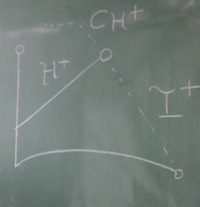In recent work with Igor Rodnianski and Yakov Shlapentokh-Rothman, we have obtained more or less complete understanding of the Cauchy problem for the scalar wave equation on Kerr backgrounds in the full sub-extremal range |a|<M.
Theorem. Solutions of the wave equation arising from regular initial data, together with their derivatives to arbitrary order, decay at a sufficiently fast polynomial rate, up to and including the event horizon.
Here, "sufficiently fast" means sufficiently fast so as to be able in principle to understand non-linear stability by exploiting dispersion. See this link for the paper.
The above result arose as a culmination of many partial results, where the above was obtained first in the Schwarzschild, and then in the very slowly rotating Kerr case |a|≪M, with independent contributions from several authors. Our result on the full sub-extremal range |a|<M relies, among other things, on the insight that the superradiant and trapped regimes are disjoint in the high frequency limit, together with a quantitative refinement of Whiting's classical mode stability result for low frequencies, proven by Yakov Shlapentokh-Rothman in a recent paper.
As was discovered recently by Stefanos Aretakis, the above theorem, as stated, in fact breaks down in the extremal case.
